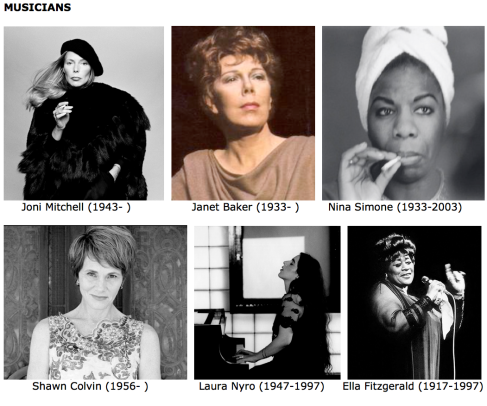It has often been said that if Joni Mitchell had been a man she would have been bigger than Bob Dylan. I’m not sure how helpful that is to anything, but certainly, for my money, her achievement in the clumsily named of singer-songwriter category places her firmly among the very best. Watch this clip from her 70th birthday celebratory concert at Massey Hall in Toronto in June this year doing one of her very best songs Furry Sings the Blues (listen to the original studio version here and read the lyrics here). A seeming homage to the old blues singer Furry Lewis and the magic that we imagine was Beale Street in Memphis at some golden age, it’s really a lament for the things that change in our lives and the bits of the and our past that are gone forever and cannot be recovered.
And if that doesn’t do it for you, try this, a live version of In France They Kiss on Main Street with the incomparable and irreplaceable Jaco Pastorius on bass and the unmistakable Pat Metheny on guitar, or this, The Judgement of the Moon and Stars (Ludwig’s Tune), an elegy to Beethoven.
I grew up with the voice of Janet Baker and still think it is unique. She is certainly the finest mezzo-soprano I’ve ever heard and has a tone that is never strident and always just sort of sucks you in and makes you feel you are drowning in honey.
Her Schubert song cycles are a wonder, as are her interpretations of Mahler, but for me her performance of Dido’s Lament (the well known and frequently performed aria When I am laid in earth) from Purcell’s opera Dido and Aeneas is absolutely unsurpassed, maybe even unsurpassable.
And if that doesn’t convince you try this, Morgen by Richard Strauss. In Italian they say that “il bel giorno si vede dal mattino” (you can tell if it will be a good day by the morning). Obviously for the Germans it’s different. But my goodness it’s beautiful.
Now there are difficult characters and there are impossible ones. But it is extraordinary how much we can forgive or overlook when faced with genius.
Nina Simone was a classically trained pianist who gave herself over to a sort of jazz that allowed her to use her extraordinary skills and unmistakable voice to express what were clearly her many grievances with the world; first among them having to endure the inequalities that were inherent when she was young due to her being both black and a woman.
It made her strident, unpredictable and sometimes violent. She was as unhappy in love as in life, but her gifts were so unequivocal and inspiring that, since she died, there continue to be newcomers to the fold of her enthusiastic admirers. Not one yet yourself? Listen to these: the jaunty and unforgettable My Baby Just Cares for Me; this clip from the Montreux Jazz Festival in which we catch a glimpse of her obsessive side before she breaks into the brilliant Backlash Blues (studio version here) and, lastly, the very moving Four Women.
Less known, younger, in some ways a pupil of the Joni Mitchell school, Shawn Colvin just has a voice and style that I like. Aided for many years by the producer John Leventhal, I just think she has written and sung some of the best things in this genre over the last fifteen years or so. I discovered her first through the 1997 album A Few Small Repairs, which features the magnificent Facts About Jimmy. From the following 2011 album Whole New You contained the strange and dark Another Plane Went Down and, lastly, from the 2012 album All Fall Down, a song about change and regret On My Own with Emmylou Harris on backing vocals.
Laura Nyro was another of the great singer-songwriters whose extraordinary talent was never full appreciated at the time and, unfortunately, her star has rather faded since. But the recovery begins here. The first song of hers I ever heard was actually sung by Barbra Streisand. Stoney End was released as a single in the UK in 1971 and I still think it’s brilliant, see what you think here.
It was some time before I caught up with Laura Nyro herself. The first thing I noticed was the enigmatic album titles, such as, Eli and the Thirteenth Confession or New York Tendaberry, or, again, Christmas and the Beads of Sweat.
From what I know she was a nervous performer and so never made the breakthrough that was certainly her due. She died at 49 of cancer.
Here is a sample of her work: Eli’s Coming (1968), The Cat Song (1976), Time and Love (1969), and, finally, also from 1976, the extraordinary I Am the Blues.
The appellation “The Voice” has been given to a number of people. Frank Sinatra, Ray Charles, etc. It is now a globally successful TV format. But, for me, there is only one the voice, and that is Ella Fitzgerald. What she could do with a song was often so thrilling and unimaginable that one has merely to bow before greatness.
With a vocal range that spanned three octaves, she shone in scat, the classic American songbook and excelled in the ballads of the 40s and 50s, songs of such lasting quality that they will be with us forever and, most likely, in the versions recorded by Ella.
Examples? There are so many, but here are three:
Summertime (1958) the outstanding Gershwin song from the opera Porgy and Bess, Reach For Tomorrow, from the exquisite 1960 album The Intimate Ella, and from Ella in Berlin, also in 1960, the classic The Man I Love.
